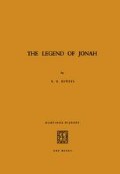Abstract
The profundity of the Book of Jonah was not fully grasped by the commentators between the time of Gregory the Great (d 604) and Bernard of Clairvaux (d 1153). In fact the literati of this period, mainly a handful of Benedictine monks who where the custodians of culture, the guardians of a largely static religious tradition, suffered from terrible handicaps, and one must marvel that they did as well as they did.1 The unsanitary, violent world in which they had to live was appalling, and even the blessed fortress of a Benedictine monastery was not always safe from marauders.2 Education was at a low ebb: there was no general literary public, so the designation the “dark ages,” is not a wholly condescending misnomer.3 Hebrew and Greek, the original languages of the Bible, were virtually unknown; and even written Latin might have proved a most difficult second language for a German or Irishman to master.4 The culture of Biblical times was alien to monkish experience; actually it can only be partly grasped to-day by a stupendous exercise of the historical imagination. So reliance on the Vulgate and on the commentaries of Jerome was paramount. Yet this factor must have had a salutary effect, since Jerome, as a mature exegete, stubbornly refuses to abandon the literal sense of Scripture: in an important letter to his friend Vitalis involving hermeneutics, he wrote: “Many things are stated in Holy Scripture which seem incredible, but nevertheless they are true. For nature cannot be contrary to the God of nature, nor can a vase say to its sculptor: why have you made me in this shape, and not in that?” 5
Access this chapter
Tax calculation will be finalised at checkout
Purchases are for personal use only
Preview
Unable to display preview. Download preview PDF.
References
See Eric Auerbach, Literatursprache und Publikum in der lateinschen Spädtantike und im Mittelalter (Bern, 1958), cap. ii.
See C. Spicq, Esquisse d’une histoire de l’exégèse latine au moyen age (Paris, 1944), p. 16.
R. K. Gordon, trans., Anglo-Saxon Poetry, (1926), pp. 282–83.
See Mrs. Elizabeth Salter in Modem Philology 64 (1966), 146–50.
Rights and permissions
Copyright information
© 1971 Martinus Nijhoff, The Hague, Netherlands
About this chapter
Cite this chapter
Bowers, R.H. (1971). Chapter III. In: The Legend of Jonah. Springer, Dordrecht. https://doi.org/10.1007/978-94-010-3054-0_4
Download citation
DOI: https://doi.org/10.1007/978-94-010-3054-0_4
Publisher Name: Springer, Dordrecht
Print ISBN: 978-94-010-3056-4
Online ISBN: 978-94-010-3054-0
eBook Packages: Springer Book Archive

